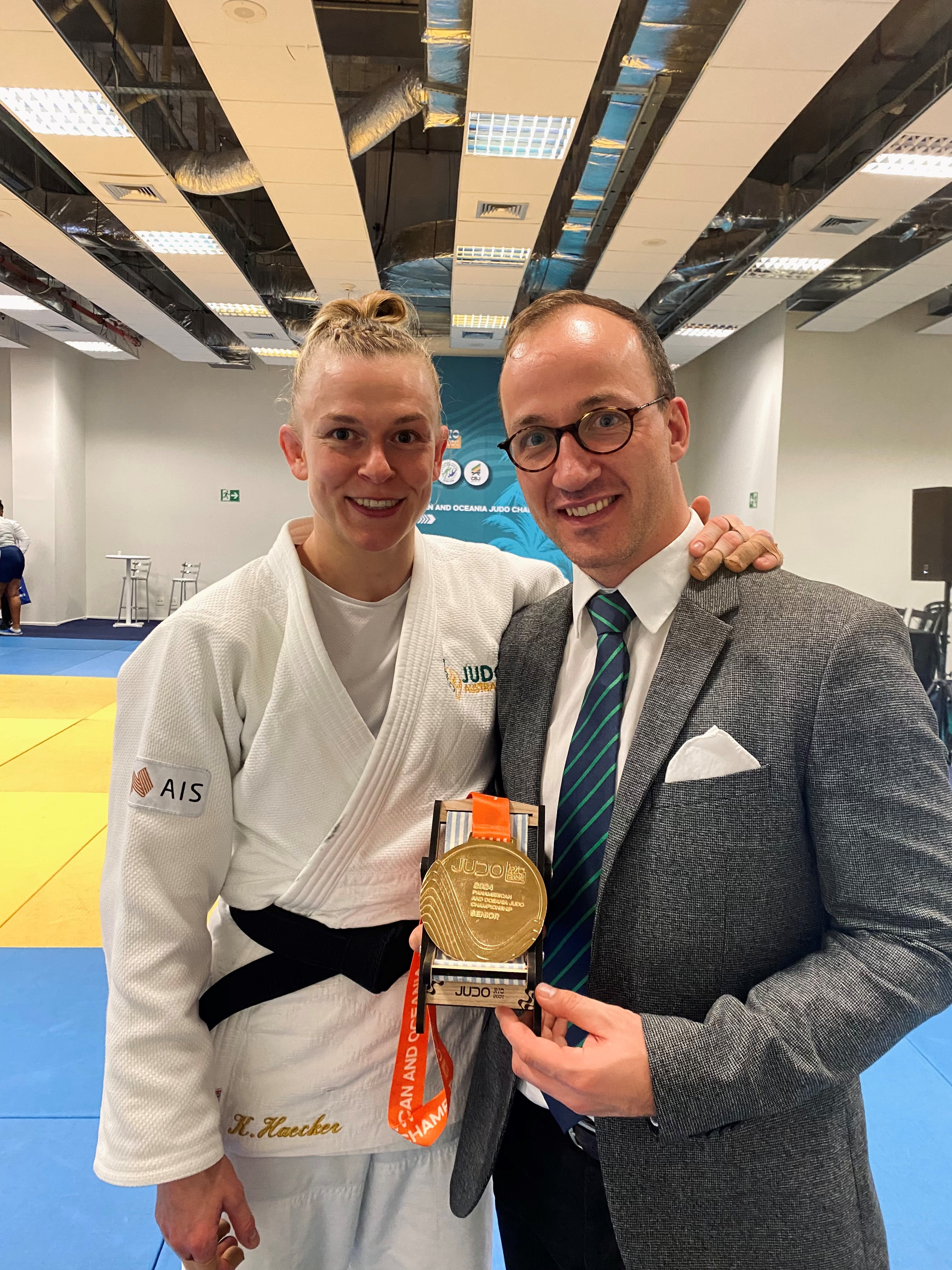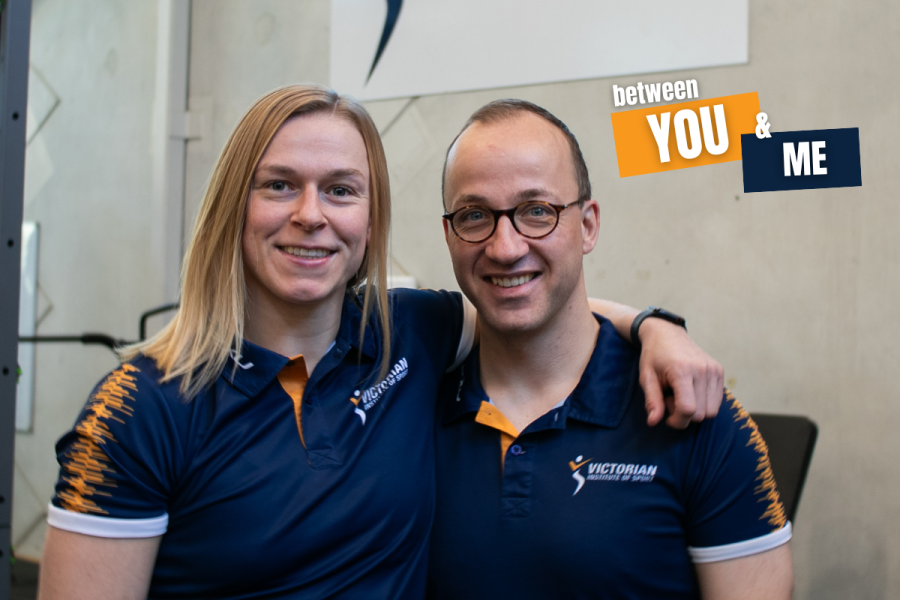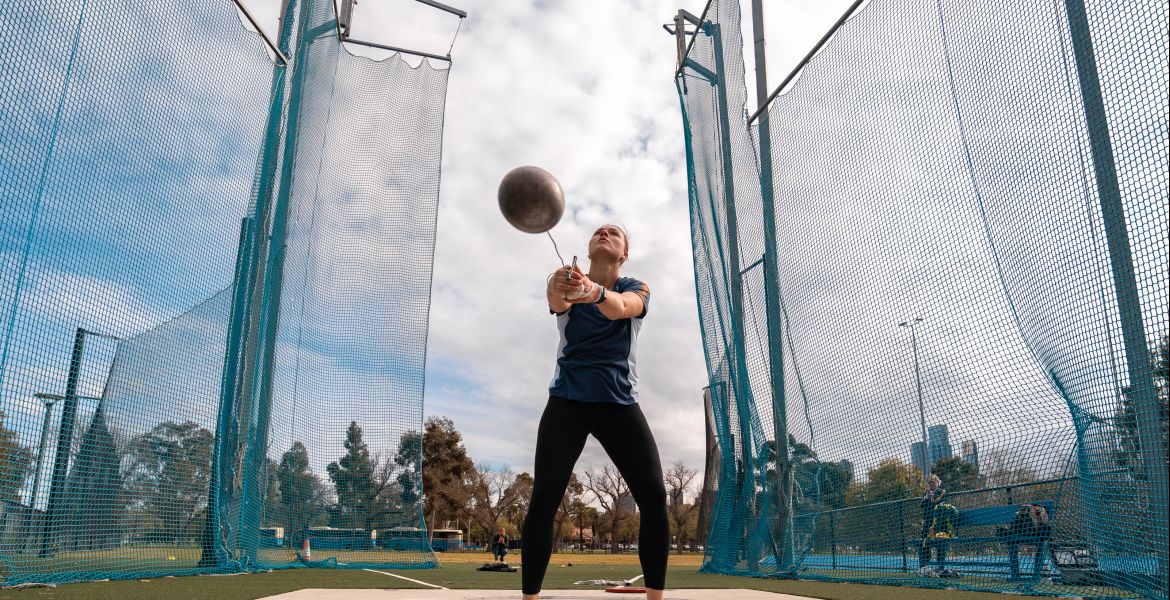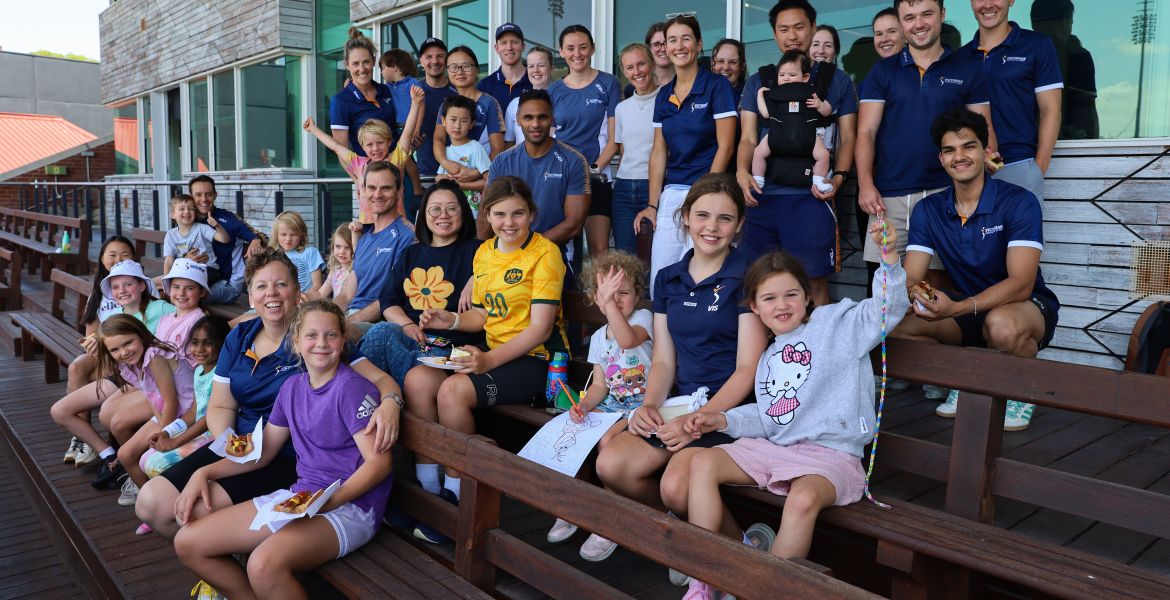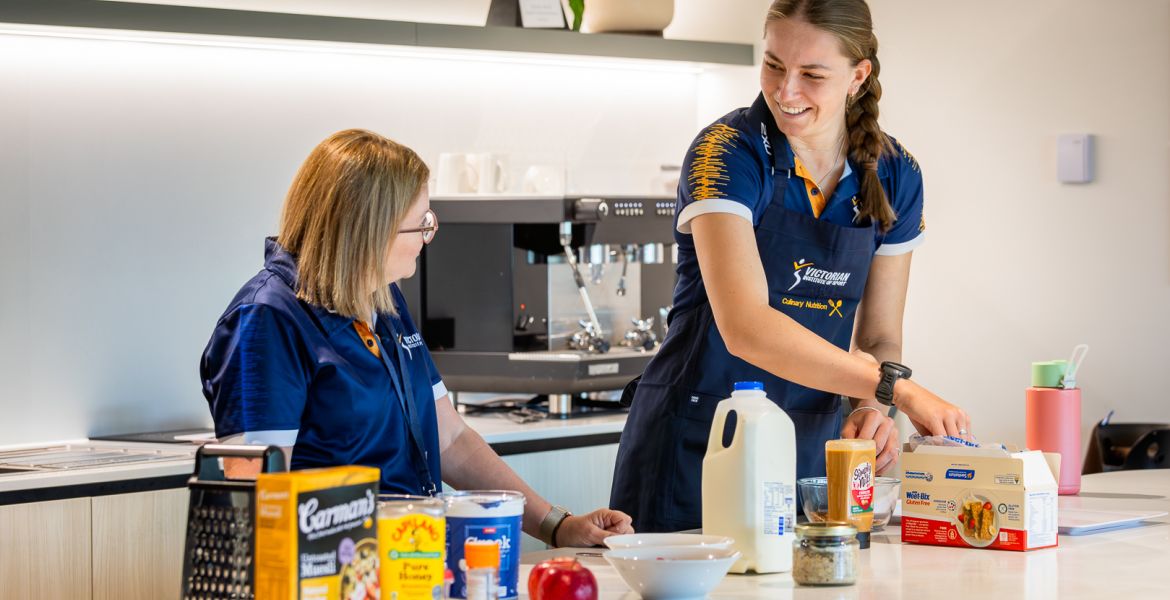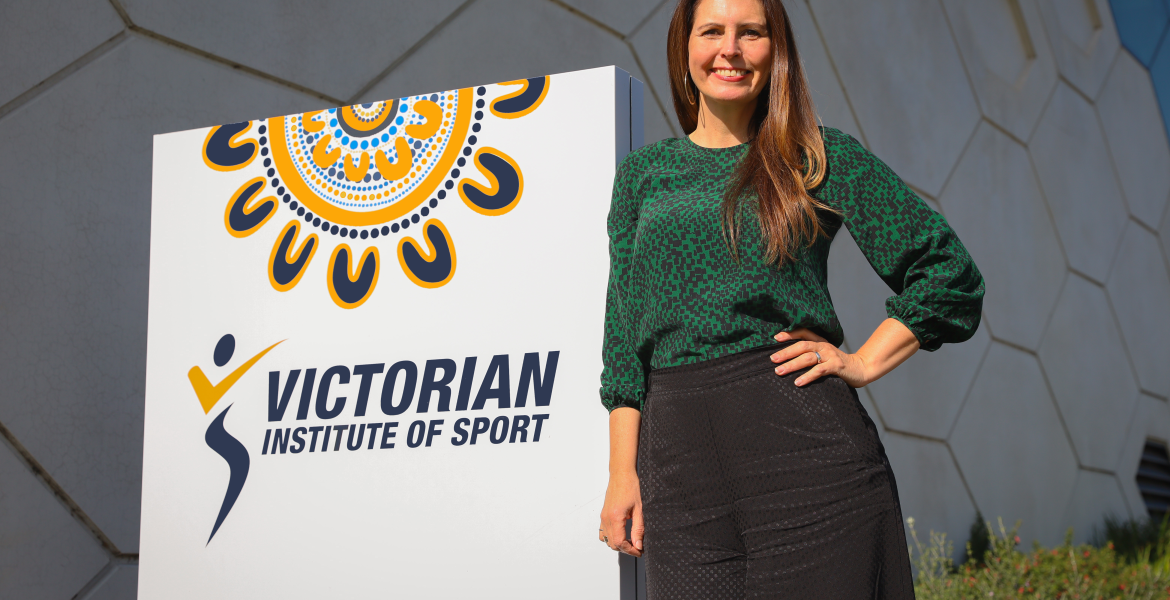VIS judoku, Katharina Haecker, recently won gold at the Pan American-Oceania Judo Championships 2024, her third straight win in the women’s -63kg. She is a two-time Olympian, currently ranked fifth in the world and is on her way to Paris 2024 qualification.
Alex Haecker is the National Program Coach for judo, making him Katharina's coach in addition to her husband.
Alex Haecker
We both come from Hamburg, a city of two million people, where judo would be one of the smallest sports there.
You couldn’t really run away from each other, even if you tried...but we didn’t try.
The more we saw each other, we realised that we did have a lot in common.
We weren’t initially from the same judo club, and there’s eight years between the two of us, so the first time I came across Katharina, as an athlete, was probably when she was eighteen.
Katharina had left to travel Australia after school, so she stopped high performance judo entirely and travelled for a year.
While she was away, she messaged me asking if she could join the training group I was running when she came back. Katharina formed an integral part of the group straight away, a group that were achieving medals at German championships and they were people she knew from before, so it was kind of a coming home scenario.
It was a difficult first three months, but she stuck with it, she got a lot better and fitter, quicker than maybe I thought she would.
Personality wise, she’s 100 per cent the same girl; she would not give up, she would wave me away and say I’ll deal with myself and kept going.
She’s a lot calmer in a lot of situations than I am, and I think we draw from each other. If I’m restless she calms me down, and the opposite is true on the other end too.
We have that shared passion for the sport, we speak about judo all the time, but mostly not about her judo or her career all the time, and that helps.
In the end you come to work, you switch on and deliver, and after that is after that, and before that is before that.
At the same time, if anyone who tells you they are totally able to separate it, they are lying.
We were training for the German championships and then one day she mentioned she had a second passport and nationality, in Australia. I wasn’t convinced that it would get her far in judo, but she started representing Australia in 2014.
Around 2018, I said to her that I think I need to leave Hamburg.
I grew up there and if you’re in one place all the time, you’re still the same guy that everybody knows growing up in the system. To mature in coaching and see the next step I felt like I needed to go somewhere else.
I was applying for a couple of jobs, and then there was the opportunity to be the national head coach of Luxembourg. So, we took that opportunity and moved, and we were living there and competing at the same time.
Judo is in a world tour style, so it wasn’t much of a change for her, but it gave me the opportunity to grow professionally.
When the 2020 Olympic Games got postponed because of COVID, I stopped coaching with Luxembourg. We went back to Hamburg for nine months to prepare for the delayed games, and to see what we wanted to do straight after the Olympics.
I got a couple of job offers in Europe and Germany straight after Tokyo 2020 but knowing that the (CombatAUS) National Performance Centre would happen here in Australia, we decided to move to Australia and not listen to any more job offers.
She said, “I came with you to Luxembourg, maybe it’s time to come with me to Australia.”
She always says that she wasn’t meant to come this far.
A lot of people didn’t see her as a priority. In European under 18 training groups.... she didn’t medal at junior nationals in Germany...... no one was thinking of her and now she has been number four or five in the world for a couple of years.
I think that’s in every young athlete’s mind, if it’s worth it and if they can be good enough.
I comforted her by saying that she should look at it in Olympic cycles. If you want to give it a shot, you need to stick in judo for at least two Olympic cycles, before that you can’t really tell – it takes that much time to actually develop into a high performing athlete, if you have the ability to do it.
She's a crazy person at times, but I think you have to be a little nuts to do this anyway; it's a combat sport and people want to kill you…almost.
But she's caring too, so I guess it's alright!
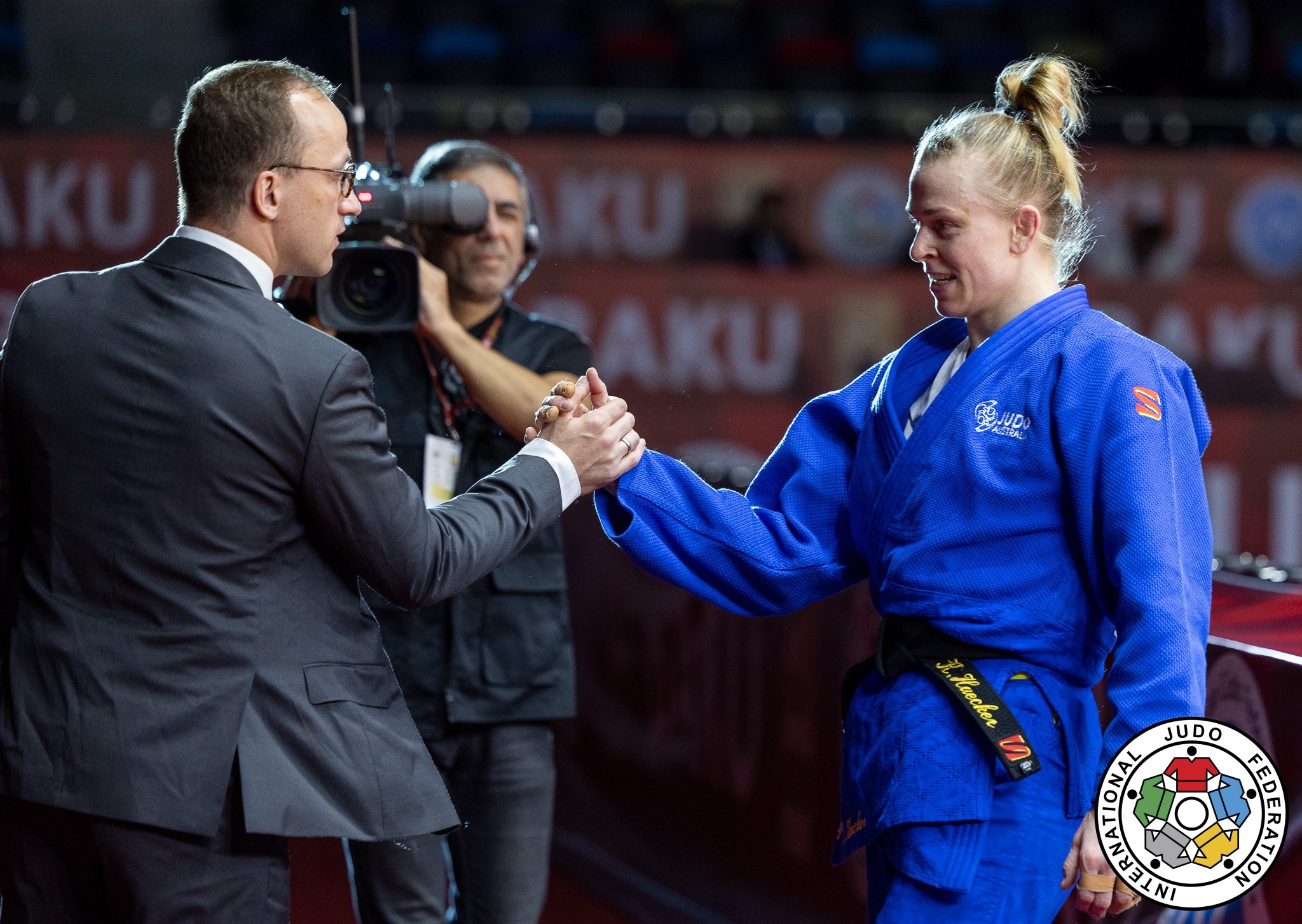
Katharina Haecker
We grew up in the same city and did judo, but it was at different clubs, and Hamburg is a big city, but in the end it's not that big - you end up seeing each other all the time.
We knew each other, we went on the same trips because our clubs were travelling together, but that's about it.
I wanted to go to Australia for a year after school and just have some fun, I wasn't even sure if I wanted to do judo professionally afterwards.
As I remember it, Alex had watched me train and told me before I went away that he’d like to work with me when I came back - if I was interested in changing clubs. My club wasn’t a high-performance club and our coach had stopped coaching. From that point on, we were at the same club and he was my coach.
I think he liked the way I trained with purpose, my commitment and hard work; it hadn't paid off at that time but I think he saw the potential. I think our bonding was over lots of failures, the beginning wasn't great for me but I was always working really hard.
I think a coach and athlete always need to have trust in that relationship, for me it was really easy to trust him. We are just very alike; we think in the same way mostly.
He is very good at having empathy and understanding people's views. I think that's why it's easy for him to build trust in relationships with his athletes and why they work really well together with him and that's how it started with us, trust.
Going to trips all the time, you naturally spend a lot of time together and at some point, I think you figure out that you like each other and become friends.
Our values align and we both just love judo, he is a judo nerd, he's watching every competition.
After a certain point I mentioned that I had an Australian citizenship and passport, and this funny idea came up of me competing for Australia.
The competition you can do without representing your country is very limited, so we were kind of stuck at the top European Club level, I was medalling there, but I couldn’t go one step further and compete for the German national team.
The whole high-performance thing wasn’t working well so I planned to keep living at home, do some sort of university and do a regular job.
The adventure was very rocky at first. It didn’t go that well. If you look where I am now, you would never have seen it coming, or at least I would never have seen it coming.
I think he's a bit more optimistic and positive with me, about what I am capable of.
That helped me a lot to get where I am now, to just have his belief when I couldn't believe in myself, I believed in him believing in me.
He's kind of the reason why I am where I am today, not just in judo but also as a person, being more confident and trusting myself and what I can do.
I think for both of us we've always had each other, he knows he can count on me to have his back no matter what. We're not going through it by ourselves, we're a team, if I lose, we lose together, if I win, we win together. For me, having a home is more like being with him, so the travelling was never really a problem.
Sometimes now is more of a struggle for me, before it was pretty much just us, and everywhere he was going I was going, so I always had my home with me, but now he’s a national coach.
So sometimes when I'm away and he stays here, it's so different for me to not have him there.
It's definitely hard, there are times we need to separate to stop sport becoming personal, but I think mostly it's fine and we can separate it well. At some points if something happened before or one of us is stressed or upset at something else already, we need to be aware and take a step back, but it's working really well for us.
Overall, I think he made me a better person.
